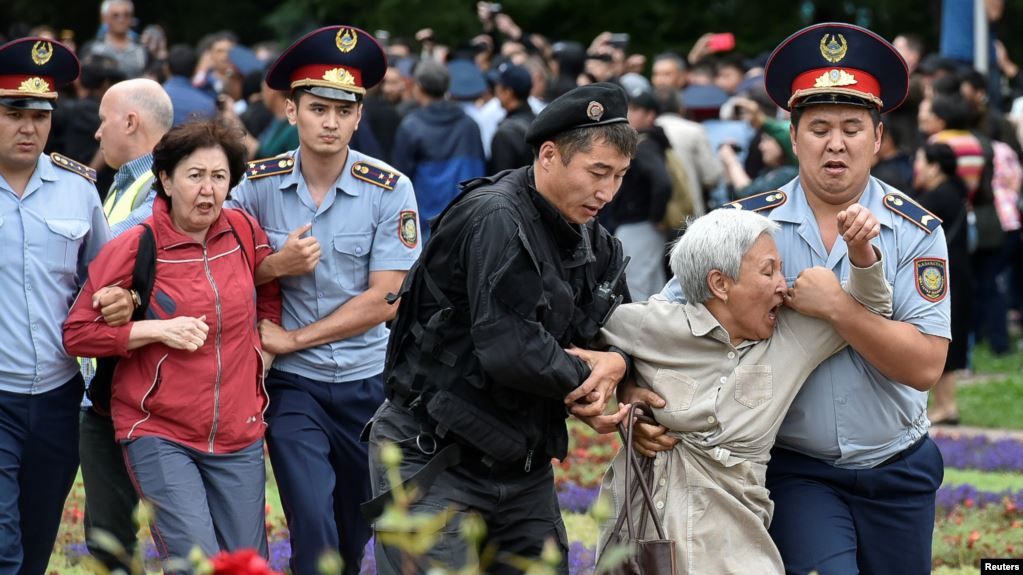
Police in Kazakhstan have detained dozens of protesters as the country holds a snap presidential election, with the chosen successor of authoritarian ex-President Nursultan Nazarbaev expected to win easily, reports RFE/RL's Kazakh Service.
The protesters in the Astana Square in Kazakhstan's largest city of Almaty were calling for a boycott of the election in which Qasym-Zhomart Toqaev is running against six government-approved candidates.
Several protesters and journalists, including RFE/RL reporter Pyotr Trotsenko, were detained and taken away in police vehicles.
Security measures have been stepped up in Almaty, with dozens of police officers deployed in Astana Square and elsewhere in the city, RFE/RL correspondents in Kazakhstan report.
Toqaev, 66, was tapped by longtime authoritarian President Nazarbaev as his successor when he stepped down on March 19 after nearly 30 years leading the energy-rich country, the largest in Central Asia.
Most polling stations opened at 7 a.m. and will close at 8 p.m. on June 9. Some polls opened an hour earlier, and 65 stations outside the country are also taking ballots.
Russian state-run TASS news agency reported that Toqaev voted at a station in the Astana Opera House in the capital, Nur-Sultan.
"Our people are concerned about many social and economic issues," he told reporters. "This is why elections are a good opportunity to decide who is going to lead the country, what our country will be like in the future."
Toqaev, who is running against six government-approved candidates, said that the election "will be open and transparent."
"At least, from the side of the government, we have done everything possible to achieve this," Toqaev added.
The other six candidates are virtually unknown to voters and have little campaign or public support.
The early election, which was called by Toqaev on April 9 to avoid "political uncertainty," is being criticized by Kazakh opposition activists an unfair and noncompetitive.
None of the elections held in Kazakhstan since it became independent in 1991 has been deemed free or fair by international organizations.
There have been an unusually large number of public demonstrations in Kazakhstan since Nazarbaev's resignation, with protesters calling for political reforms and many urging voters to boycott the vote.
Many activists have been detained and given fines or jail sentences, while some young male activists have been suddenly drafted into the army.
Large groups of Kazakh mothers have held numerous rallies in recent months to demand increased social benefits and housing, underscoring a general dissatisfaction with the government seen in other demonstrations and civil meetings.
Despite officially stepping down as president, Nazarbaev holds many important political positions and still wields considerable power within the country and inside his political party, Nur-Otan, whose presidential candidate is Toqaev.
Nazarbaev's reign was marked by economic progress fueled by plentiful reserves of oil and natural gas, but it was largely overshadowed by despotic rule that shut down independent media, suppressed protests, and trampled democratic norms.
Human Rights Watch wrote recently that Kazakhstan "heavily restricts" basic freedoms such as speech, religion, and assembly, while Freedom House calls the Kazakh government a "consolidated authoritarian regime."
A career diplomat educated in Moscow and considered an expert on China, Toqaev has served as Kazakh prime minister, foreign minister, and chairman of the Senate. He also worked for the United Nations in Geneva in 2011-13.
Toqaev has said publicly that he will continue the same policies as Nazarbaev if elected as president.
In preelection moves likely aimed at consolidating support for Toqaev, the state recently increased salaries for government employees and hiked welfare payments.
Nazarbaev's daughter, Darigha, replaced Toqaev as Senate leader in March and would be first in line to the presidency should anything happen to the president.
The six candidates permitted to run against Toqaev in the election are parliament deputies Jambyl Ahmetbekov and Dania Yespaeva, labor union leader Amangeldy Taspikhov, state sports executive Sadybek Tugel, scientist Toleutai Rahimbekov, and journalist Amirjan Qosanov.
Kazakhstan's voters among the population of 18.7 million will vote at 238 polling stations nationwide as well as at the Kazakh Embassy in Moscow and consulates in St. Petersburg, Kazan, Astrakhan, and Omsk.
Aware of the uptick in anti-government protests since Nazarbaev stepped down, the deputy mayor of the Kazakh capital -- newly reminted Nur-Sultan, in honor of the former president -- said authorities were prepared for any "provocations."
"We are ready for any provocations [and are] working on different scenarios, but all this will be nipped in the bud as nothing must stand in the way of the voting," Erlan Kanalimov told TASS.
With reporting by Reuters and TASS
 В Атырау -10
В Атырау -10